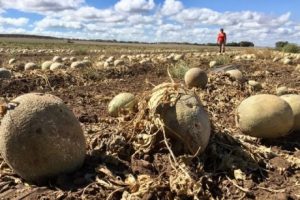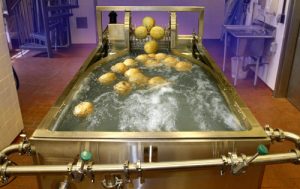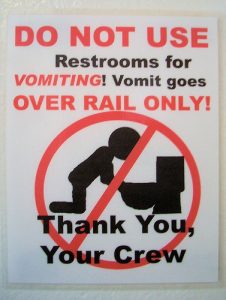My thoughts go to Australian rockmelon growers because they’ve been sold down the stream.
 In April, thousands of rockmelons were left to rot in paddocks near Geraldton on the Western Australian coast, record low prices and lost markets meant they were simply not worth picking.
In April, thousands of rockmelons were left to rot in paddocks near Geraldton on the Western Australian coast, record low prices and lost markets meant they were simply not worth picking.
Grower Carol Metcalf said the rows of rotting melons were the result of the listeria outbreak on a rockmelon farm more than 3,500 kilometres away in New South Wales.
Under a new plan released this week, all rockmelon farms in Australia will be inspected and work will be undertaken on each individual farm to ensure that the highest standards are implemented and maintained.
At the time of the outbreak on February this year, the NSW Food Authority speculated that the most likely cause of the listeria outbreak was contaminated soil possibly not being properly washed off the skin of the fruit.
In addition it was thought that a weather event may have increased the listeria bacteria on the product.
But the formal investigation into the cause of the outbreak has not been completed by the NSW Food Authority and therefore the official report on the cause has still not been released.
What is planned is visits to all Australian rockmelon growers and packing sheds to review and audit current practice and critical control points and provide one-on-one food safety consultations with growers, managers and key farm staff.
The development of a melon food safety Best-Practice Guide, was informed by the findings from consultations, feedback from retailers and other key stakeholder groups.
 The development of a ‘toolbox’ for grower use including risk assessment templates, training guides, food safety posters and record sheets to support food safety programs — this will be housed on the Australian Melon Association website.
The development of a ‘toolbox’ for grower use including risk assessment templates, training guides, food safety posters and record sheets to support food safety programs — this will be housed on the Australian Melon Association website.
Regional roadshows in key growing regions will highlight the availability and contents of the toolbox and Best Practice Guide.
A helpdesk to provide technical support to growers, packers and other stakeholders will also be developed.
Australian Melon Association industry development manager Dianne Fullelove said the new initiatives would ensure that every rockmelon grower in Australia had the highest level of food safety possible.
“NSW DPI will lead the project and the key is that they will visit every farm and work with every grower to fix any problems or issues.
“We want to make food safety as good as it can be,” Ms Fullelove said.
“This new initiative will make that reputation even stronger and give our growers sure-fire tools to support our product integrity for decades to come.
“This move will put us ahead of the game.”
Food safety isn’t a game, not when your product contributes to the death of seven people and one miscarriage.
Why are melon growers relying on government to visit farms (oh, right, money).
They should hire their own people to be out front on any food safety issue; government is the last source to rely on. And don’t act like this is something new: There have been plenty of outbreaks of Listeria and Salmonella on rockmelon over the years.
(A table of rockmelon-related outbreaks is available here.)
Some basic questions that have yet to be answered:
- was the farm prone to flooding and near any livestock operations;
- what soil amendments, like manure, were used;
- after harvest were the rockmelons placed in a dump tank;
- was the water in the dump tank regularly monitored for chlorine levels;
- did a proper handwashing program exist at the packing shed;
- were conveyor belts cleaned and tested;
- did condensation form on the ceiling of the packing shed;
- were transportation vehicles properly cooled and monitored;
- was the Listeria in whole cantaloupe or pre-cut; and,
- was the rockmelon stored at proper temperatures at retail?
Stop waiting for change to happen and take charge, without relying on government: Your growers are still losing money.









